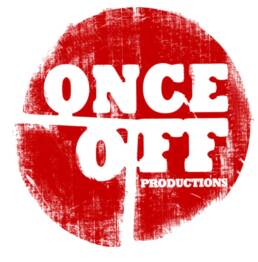Let's turn about together.
I know that conversation (with words, yes, but also with bodies, with spaces, with images) is a big part of why I first wanted to be involved in making performance. Over time, the word conversation has also meant the place where one dwells, or a way of life, or to keep company with or to turn about with someone or something. All of these meanings vibrate with my old, old feelings about live performance. I want to dwell in these places.I have made it my way of life. I’m interested, as an artist and arts manager, in what slowing down does to our work — practically and aesthetically. At a certain professional level in Ireland, taking the time to have creative conversations with each other seems to have become a luxury in recent years. Is it really luxury? Is it not basic? Radical even, also in the sense of being at the root? How can we speak to anyone else if we don’t take the time to speak amongst ourselves? The next four years will probably see me with my foot on the brake. Being the mildly irritating person who tries to insist that we move slower, that we all go for a coffee or a drink together.I want to turn ideas over with my peers. We generate the future by talking about it.
Lian Bell
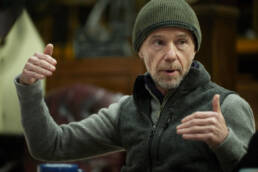
MEL MERCIER
I would certainly like to see more design-led work, whatever that is, whatever form it might take over the next four years, where designers are in from the beginning, in the conceptualisation of the piece, of the research, of the exploration, of devising the piece, of coming up with the ideas. It’s about designers having more of a voice in the creation of the piece from the very start, so that it’s a shared vision, it’s a shared idea. So we’re not just waiting until we’re all in the room together, during the tech, where we’ve all got to somehow or other be singing off the same hymn sheet, trying to create something together, but actually, that even before we get in there, we’ve imagined something together, that then we’re trying to create. And perhaps that relates also to the question of text, and the role of the script, the role of directors — a kind of rebalancing, so that there are more opportunities for us as designers to step into a creative space and bring more of our ideas, more of ourselves into it.
SINÉAD WALLACE
You mentioned sustainability, and that does require a new mode of working. There’s a whole outline of how theatre can be made that way. And it’s less hierarchical, because everyone has to be on board earlier, and talking sooner, and developing concepts together, so that nothing is last minute and ordered on Amazon, so that everything comes together sooner. But it means that when you get into rehearsals, everyone knows already what world they’re building. And there’s flexibility in it. But there’s also space to source things. In the model that we work in at the moment, all the money goes into the set and the stuff. Whereas in this other model, the money goes to the people for their time. And they spend that time making things cheaper, essentially, because you can use things that already exist. It also gives people longer thinking together. And it’s that thinking together that allows us to be really collaborative, that idea of play time. We give students play time, and space to fail, and space to develop ideas and conversations. Whereas we don’t ever get that ourselves anymore.
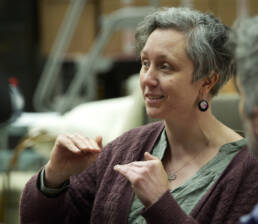

JACK PHELAN
I have a responsibility to make sure that what I do doesn’t affect liveness. I think that’s something that theatre itself should be focused on, it’s what makes theatre theatre. And if it’s under pressure from all these other forms of entertainment and media, then why run away from what makes it what it is? And it doesn’t take anything to relearn that or recapture it. Or maybe there are new ways to be live, but not necessarily going high tech or with high production value pre-made images. In the next four years I’d love to see less stuff, more time, and more experimentation with collaboration and the tools of the live. I think that would be exciting. I think that you would also, crucially, have to find new audiences for stuff like that. And build and give audiences things they aren’t getting through their screens or streaming services or game consoles. Theatre has everything going for it, in that sense. It seems exciting. And just stop racing towards scale and complexity, which is clearly just not working on many fronts, but just go nimble and weird. Get a bit weird as well.
CIARÁN BAGNALL
My interest in the next four years is, how do we take care of people? And what can we put into action now, be that a union, or establishments or buildings? How do we open that conversation to protect our workers and protect the people who create the work? We’ll have to see a bigger conversation about working hours, and pay rates, and things we consider to be beneficial for us in the long run as artists and as designers. I’m interested in how we support our artists, and, critically, how we support our freelancers in this country. Just looking after people really.
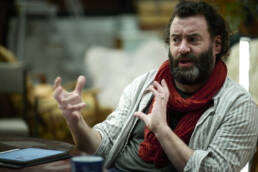
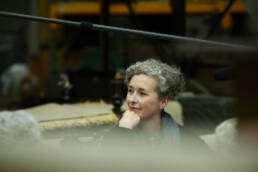
LIAN BELL
Something that I’m really trying to hold on to, in the next four years, is that sense of us, as an audience, and as performers and makers, of us being in the room together. I tend to prefer smaller theatre spaces in general, because I actually feel like I’m with people. And there’s the slight jeopardy of something happening live on stage where things could go wrong. We’ve all been in those moments where something happens, where actually it’s quite dramatic, something happens, and everything has to stop. And then it picks up again, and there’s this little rush in the audience of, we’re all re-stepping into this together. And we all know it’s absolutely ludicrous, but we’re all doing it. And it’s a beautiful feeling, and for me, that’s hugely important, and I think will become increasingly important in a world where we’re so segmented—you know, we spend more time on our own in our homes, or with our friends and family in our homes—to be in a room collectively, together, with this brilliantly ludicrous proposition of imagining together, I feel like that’s just going to be more and more valuable over time.
MEL MERCIER
Being on the edge is the place where I like to be no matter in what domain it is, where I feel most comfortable, being uncomfortable on the edge in a way. And at the edge is a place which overlaps with other edges, with other domains, so you’re likely to meet other people around the edge, that idea of just edge-walking, hanging out on the edge. Where you may be not too comfortable in the centre. But part of the problem is that you’re often not seen by the centre. So you’re on the edge, but you meet other edge-walkers. And it’s a place of possibility, and discovery, and uncertainty, and play, and liminality, all those things.


EIMER MURPHY
There are things that occupy my mind all the time. One of them is the amount of waste. And the other is the wanton destruction of old objects for theatre. We’re sitting in this warehouse surrounded by what is the material culture of the Abbey canon, essentially. And I get myself into a terrible knot trying to protect the things that I know have significance, and that I feel like should be in a museum, while also understanding that we have a very small budget, and that these things are only here to earn their keep by being used.
In the next four years, I would love someone to have invented an ever-expanding warehouse, so that space wasn’t going to be the thing that meant the end of something potentially valuable. And the idea that things can go in a skip, and never be seen again, and we lose things, just because of not having enough time, not being able to take enough care, not being able to identify those things, and just because we have to make space for new things. There are things in here that are genuinely artifacts, most of which I don’t even know about. I just know there are things here that are worth protecting and securing, and I also know how many things, that were irreplaceable, have walked out the door and gone into a skip because somebody was here who didn’t understand and threw out the wrong thing.
LIAN BELL
I’m interested in the structures. I’m not interested in making shows to tell everybody how bad climate change is, I’m way more interested in us interrogating the way that we do things. All of us are at a certain stage in our careers, and we have a lot of experience, a lot of opinions, and a small amount of authority, to be able to say this is actually really important. We need to change our processes when we need to talk about that. There’s a certain point where you’re just like, well, I can’t just not do anything.

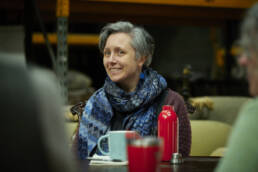
SINÉAD WALLACE
I think that’s a lovely way of thinking about it, to open the space for other people to intervene, because sometimes you just need to open that door and be like, there’s this other world in here, do you want to come? It’s an invitation rather than, stop doing that. Because I hate the stop doing that. What we want to do is invite people to think about things differently. Because the only progress that ever has happened is from someone going, wait a second, there’s another way. I lit a show in 2019, where I committed to doing an LED show, because we were in the middle of the tungsten debate, and I wanted to see if I could do it. And it was really, really satisfying to do that. But the actual thing that made the difference was that we were working in July and July is traditionally plastic-free July. And I talked about it all the time in tech. I didn’t set out to make everyone feel guilty. But I talked about how difficult it was to find food that wasn’t wrapped in plastic, and to make those choices. And by the end of the week, people had reusable water bottles instead of having plastic bottles. And people had bought keep cups to put their coffee in, instead of coming over with multiple coffee cups. And it made me realise that actually all we needed was the conversation, because that made much more of a difference to those twelve people on that show than me doing an LED show, because it made people think about the waste. A few months later I was on another show with one of those people, and they still had their keep cup, and they still had their water bottle, and I was like, okay, one person at a time. And those conversations made those people start somewhere. And then the next steps are easier.
ROB MOLONEY
One thing I think about, being a bit younger, and maybe emerging, some of my colleagues, I think about retirement for them? And what retirement means for someone in this industry, when you’re not coming into a very good pension, or you’re still renting as a retired person, how do we care for people? And what does the industry do to support on that level, maybe to keep people in employment for a bit longer, or whatever that is? And I think in the opposite direction as well, of very young people coming into the industry, who are facing much more difficulty in terms of housing, this kind of stuff, how do we keep them in the industry? And how do we train them, and keep them engaged, and not have to face some of the issues we all had to face when we were starting off? So, there are both ends of that spectrum. I’m curious about what we have to offer, as a community. I don’t have any answers.
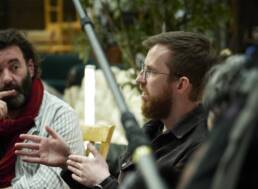

LIAN BELL
I’ve been asked by people who are students, or maybe just coming to the end of their studies, how did you get in, what was your pathway? Most of the time, well I can tell you what my pathway in was, but I don’t think that pathway exists anymore. I don’t think it’s possible to do what I did. If you’re asking me how to become whatever it is I am, you have to work it out for yourself, I’m afraid. As I’m talking about that, I’m thinking about the shape of a river. The river has changed shape since I went down it.
MEL MERCIER
One of the great gifts that I’ve learned is that leaving is often the best gift that you can give, because it leaves space for somebody else to step into. As long as you’re moving for the right reasons, it’s a great gift. And if you’re privileged and blessed enough to be able to know where the next move is, and you can go there, and you leave the space in good enough condition, and other people want to walk in, it’s just brilliant, for you and for that other person, and for the place you leave.
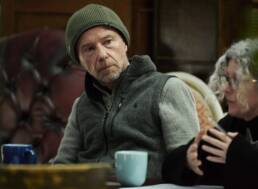

ROB MOLONEY
Thinking outside of theatre, in general, there has been this explosion of creativity since the pandemic. And I think people are just making loads of stuff all the time. It’s in clubs, it’s across various genres, and art forms, and venues, across the whole country, in many countries. There is room to say, how about you come in and try it out here? I think theatre can be much more open in terms of who we collaborate with. It feels sometimes like a very closed group. I think there is lots of room for conversation and dialogue across art forms as well. There’s something very exciting about that, of seeing what people are doing beyond the little boundary we have, and I think people outside are maybe freer to do some things. And I think they’re freer to be political in their work as well, and to find different ways of assembling people together, who have common interests. There’s a healthier ecosystem that we can reach for or strive for.
LIAN BELL
I know the conversations will continue on in Prague. But I would love to think that in whatever shape or form these conversations get to continue on amongst us. Because I think it’s been a very rare moment, actually, not rare moment, completely unique moment, to have these kinds of conversations amongst designers like this. I think it’s very rich, and very nourishing, personally. So I would love to see a way of us, in a broader sense, continuing something that keeps us talking.





